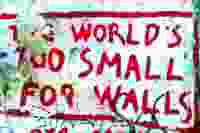
From Margate to Molenbeek we must fight the enclave society
Enclaves are the antithesis of diversity. The starting point of any campaign to promote diversity should be to tear down the walls protecting these enclaves, argues Professor Darren Zook.
During the investigations that followed the atrocious terrorist attacks in Paris in November 2015, one of the areas of focus was a neighbourhood in Brussels known as Molenbeek. Molenbeek was known to be a part of town with a highly-concentrated Muslim population, reaching in some areas as high as 80%. The question on the minds of investigators at the time, as they intensified their search for the mastermind there (Salah Abdesalam), was whether or not Molenbeek was somehow a hotbed of radicalization or a sanctuary for terrorists.
While the question of radicalization and its relationship to different social environments is a complex and important question, there is, in fact, a much more fundamental question we should be asking that goes right to the heart of the matter—namely, why do we have identity-based enclaves like Molenbeek in the first place?
Diversity as a concept is predicated on the idea that we should celebrate the heterogeneity of our social fabric with the specific aim that we all benefit when people from different walks of life come together to share the same social space. We interact with one another in this shared social space, and collectively build an intercultural forum in which to experience and understand different perspectives in concert with one another.
The current approach we have to diversity, however, actively works to undermine the professed aspirations of diversity itself.
The benefits of diversity policies and programs are distributed based on membership in a specific identity-group, which means the best way to stake a claim to the benefits of such programs is to belong to one such recognized group. The end result is an enclave society – the opposite of what diversity is supposed to be. A diverse set of separate enclaves does not a diverse society make. It only gives the illusion of diversity as numerous homogeneous (non-diverse) enclaves existing alongside one another, with little or no interaction.
Enclaves don't just exist as physical entities, such as separate neighbourhoods of separate identities. Enclaves can exist as mindsets of separation as well. When we refer to the LGBTQI+ community, for example, there is an assumption that this is a cohesive and coherent community that has a collective, unified voice. Community activists within the community fight for "equity and inclusion" for their identity-group as part of the process of building diversity. But can a person who is not LGBTQI+ join that community? The answer here is – of course – no, which brings us to the impossible contradiction of trying to build an inclusive society with exclusive communities.
The implications of allowing enclave societies to strengthen their walls of separation (whether physical or mental) are profound for diversity policy and practice.
We wonder why diversity isn't working the way it should, and the answer usually comes in simplistic sloganeering about how "dominant communities" thwart efforts to fight for social justice, lest they lose their dominant position. But the reality is that diversity cannot work while it is built on an impossible premise: namely, that we can build an inclusive society out of exclusive social groups.
So what should we do to make diversity work toward the purpose for which it was designed, which would be to create an equitable and inclusive society?
First and foremost we need to liberate the enclave by designing diversity policies that encourage and reward individuals to walk away from pre-packaged group identities forged in exclusive enclaves.
Second, we need to open up an honest and critical dialogue about social dynamics between and within identity-based groups – one that takes us far beyond the familiar but stale idea that "dominant groups oppress and non-dominant groups are oppressed".
As an example, consider the consternation in January 2017 when Philadelphia's Commission on Human Relations reported long-standing racism and sexism in what the city knows as the Gayborhood (in essence, a gay enclave). Diversity activists and proponents reacted as if the report had said that space aliens had been seen riding through the city streets atop rainbow-coloured unicorns. How was it even possible for an oppressed community to oppress others?
The question itself reveals everything that is wrong with our current approach to diversity. The very language of diversity stumbles on its intrinsic inconsistencies. In California, for example, a community that is 90% white supposedly "lacks diversity," while a community that is 90 per cent Hispanic is somehow a "diverse community." Clearly, those two statements cannot simultaneously be true.
Enclaves are the antithesis of diversity. Whether in Brussels or in Berkeley, the starting point of diversity should be to liberate the enclaves.
If it is wrong to build a wall along the border of a nation, then it must also be wrong to build one along the borders of our communities and neighbourhoods.
Diversity should be designed to dissolve the walls that divide us, not to make them stronger.
Professor D. C. Zook teaches in Global Studies and Political Science at the University of California, Berkeley. He is the author most recently of the four-volume series Ourselves Among Others: The Extravagant Failure of Diversity in America and An Epic Plan to Make It Work (2018). The ideas for this article are taken from vol. 2 of the series, Liberating the Enclave.















